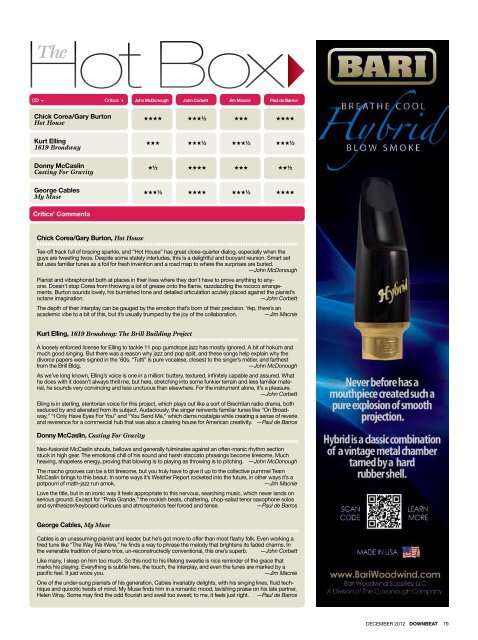Ron Carter Esperanza Spalding - Downbeat
Ron Carter Esperanza Spalding - Downbeat
Ron Carter Esperanza Spalding - Downbeat
Create successful ePaper yourself
Turn your PDF publications into a flip-book with our unique Google optimized e-Paper software.
Hot<br />
The<br />
Box<br />
CD Critics <br />
John McDonough John Corbett Jim Macnie Paul de Barros<br />
Chick Corea/Gary Burton<br />
Hot House<br />
★★★★ ★★★½ ★★★ ★★★★<br />
Kurt Elling<br />
1619 Broadway<br />
★★★ ★★★½ ★★★½ ★★★½<br />
Donny McCaslin<br />
Casting For Gravity<br />
★½ ★★★★ ★★★ ★★½<br />
George Cables<br />
My Muse<br />
★★★½ ★★★★ ★★★½ ★★★★<br />
Critics’ Comments<br />
Chick Corea/Gary Burton, Hot House<br />
Tee-off track full of bracing sparkle, and “Hot House” has great close-quarter dialog, especially when the<br />
guys are tweeting twos. Despite some stately interludes, this is a delightful and buoyant reunion. Smart set<br />
list uses familiar tunes as a foil for fresh invention and a road map to where the surprises are buried.<br />
<br />
—John McDonough<br />
Pianist and vibraphonist both at places in their lives where they don’t have to prove anything to anyone.<br />
Doesn’t stop Corea from throwing a lot of grease onto the flame, razzdazzling the rococo arrangements.<br />
Burton sounds lovely, his burnished tone and detailed articulation acutely placed against the pianist’s<br />
octane imagination. <br />
—John Corbett<br />
The depth of their interplay can be gauged by the emotion that’s born of their precision. Yep, there’s an<br />
academic vibe to a bit of this, but it’s usually trumped by the joy of the collaboration. —Jim Macnie<br />
<br />
Kurt Elling, 1619 Broadway: The Brill Building Project<br />
A loosely enforced license for Elling to tackle 11 pop gumdrops jazz has mostly ignored. A bit of hokum and<br />
much good singing. But there was a reason why jazz and pop split, and these songs help explain why the<br />
divorce papers were signed in the ’60s. “Tutti” is pure vocalese, closest to the singer’s métier, and farthest<br />
from the Brill Bldg. <br />
—John McDonough<br />
As we’ve long known, Elling’s voice is one in a million: buttery, textured, infinitely capable and assured. What<br />
he does with it doesn’t always thrill me, but here, stretching into some funkier terrain and less familiar material,<br />
he sounds very convincing and less unctuous than elsewhere. For the instrument alone, it’s a pleasure.<br />
<br />
—John Corbett<br />
Elling is in sterling, stentorian voice for this project, which plays out like a sort of Brechtian radio drama, both<br />
seduced by and alienated from its subject. Audaciously, the singer reinvents familiar tunes like “On Broadway,”<br />
“I Only Have Eyes For You” and “You Send Me,” which dams nostalgia while creating a sense of reverie<br />
and reverence for a commercial hub that was also a clearing house for American creativity. —Paul de Barros<br />
Donny McCaslin, Casting For Gravity<br />
Neo-fusionist McCaslin shouts, bellows and generally fulminates against an often-manic rhythm section<br />
stuck in high gear. The emotional chill of his sound and harsh staccato phrasings become tiresome. Much<br />
heaving, shapeless energy, proving that blowing is to playing as throwing is to pitching. —John McDonough<br />
The macho grooves can be a bit tiresome, but you truly have to give it up to the collective pummel Team<br />
McCaslin brings to this beaut. In some ways it’s Weather Report rocketed into the future, in other ways it’s a<br />
potpourri of math-jazz run amok. <br />
—Jim Macnie<br />
Love the title, but in an ironic way it feels appropriate to this nervous, searching music, which never lands on<br />
serious ground. Except for “Praia Grande,” the rockish beats, chattering, chop-salad tenor saxophone solos<br />
and synthesizer/keyboard curlicues and atmospherics feel forced and tense. <br />
—Paul de Barros<br />
<br />
George Cables, My Muse<br />
Cables is an unassuming pianist and leader, but he’s got more to offer than most flashy folk. Even working a<br />
tired tune like “The Way We Were,” he finds a way to phrase the melody that brightens its faded charms. In<br />
the venerable tradition of piano trios, un-reconstructedly conventional, this one’s superb. —John Corbett<br />
Like many, I sleep on him too much. So this nod to his lifelong sweetie is nice reminder of the grace that<br />
marks his playing. Everything is subtle here, the touch, the interplay, and even the tunes are marked by a<br />
pacific feel. It just woos you. <br />
—Jim Macnie<br />
One of the under-sung pianists of his generation, Cables invariably delights, with his singing lines, fluid technique<br />
and quixotic twists of mind. My Muse finds him in a romantic mood, lavishing praise on his late partner,<br />
Helen Wray. Some may find the odd flourish and swell too sweet; to me, it feels just right. —Paul de Barros<br />
DECEMBER 2012 DOWNBEAT 79
















